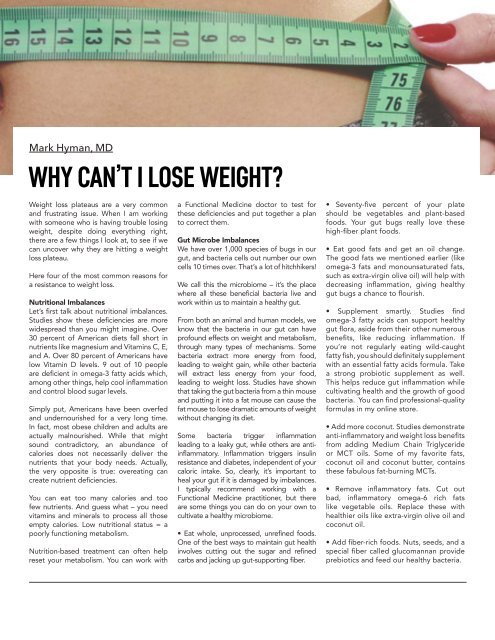24/Seven October 2017
Change Your Attitude...Change Your Life 24 Seven is a digital magazine that provides readers with the tools needed for personal growth, professional development, and self-empowerment. Each month, nationally recognized experts and leaders in their field, provide advice in areas such as spirituality, self-help, personal finance, health, wellness, and business.
Change Your Attitude...Change Your Life 24 Seven is a digital magazine that provides readers with the tools needed for personal growth, professional development, and self-empowerment. Each month, nationally recognized experts and leaders in their field, provide advice in areas such as spirituality, self-help, personal finance, health, wellness, and business.
You also want an ePaper? Increase the reach of your titles
YUMPU automatically turns print PDFs into web optimized ePapers that Google loves.
Mark Hyman, MD<br />
WHY CAN’T I LOSE WEIGHT?<br />
Weight loss plateaus are a very common<br />
and frustrating issue. When I am working<br />
with someone who is having trouble losing<br />
weight, despite doing everything right,<br />
there are a few things I look at, to see if we<br />
can uncover why they are hitting a weight<br />
loss plateau.<br />
Here four of the most common reasons for<br />
a resistance to weight loss.<br />
Nutritional Imbalances<br />
Let’s first talk about nutritional imbalances.<br />
Studies show these deficiencies are more<br />
widespread than you might imagine. Over<br />
30 percent of American diets fall short in<br />
nutrients like magnesium and Vitamins C, E,<br />
and A. Over 80 percent of Americans have<br />
low Vitamin D levels. 9 out of 10 people<br />
are deficient in omega-3 fatty acids which,<br />
among other things, help cool inflammation<br />
and control blood sugar levels.<br />
Simply put, Americans have been overfed<br />
and undernourished for a very long time.<br />
In fact, most obese children and adults are<br />
actually malnourished. While that might<br />
sound contradictory, an abundance of<br />
calories does not necessarily deliver the<br />
nutrients that your body needs. Actually,<br />
the very opposite is true: overeating can<br />
create nutrient deficiencies.<br />
You can eat too many calories and too<br />
few nutrients. And guess what – you need<br />
vitamins and minerals to process all those<br />
empty calories. Low nutritional status = a<br />
poorly functioning metabolism.<br />
Nutrition-based treatment can often help<br />
reset your metabolism. You can work with<br />
a Functional Medicine doctor to test for<br />
these deficiencies and put together a plan<br />
to correct them.<br />
Gut Microbe Imbalances<br />
We have over 1,000 species of bugs in our<br />
gut, and bacteria cells out number our own<br />
cells 10 times over. That’s a lot of hitchhikers!<br />
We call this the microbiome – it’s the place<br />
where all these beneficial bacteria live and<br />
work within us to maintain a healthy gut.<br />
From both an animal and human models, we<br />
know that the bacteria in our gut can have<br />
profound effects on weight and metabolism,<br />
through many types of mechanisms. Some<br />
bacteria extract more energy from food,<br />
leading to weight gain, while other bacteria<br />
will extract less energy from your food,<br />
leading to weight loss. Studies have shown<br />
that taking the gut bacteria from a thin mouse<br />
and putting it into a fat mouse can cause the<br />
fat mouse to lose dramatic amounts of weight<br />
without changing its diet.<br />
Some bacteria trigger inflammation<br />
leading to a leaky gut, while others are antiinflammatory.<br />
Inflammation triggers insulin<br />
resistance and diabetes, independent of your<br />
caloric intake. So, clearly, it’s important to<br />
heal your gut if it is damaged by imbalances.<br />
I typically recommend working with a<br />
Functional Medicine practitioner, but there<br />
are some things you can do on your own to<br />
cultivate a healthy microbiome.<br />
• Eat whole, unprocessed, unrefined foods.<br />
One of the best ways to maintain gut health<br />
involves cutting out the sugar and refined<br />
carbs and jacking up gut-supporting fiber.<br />
• <strong>Seven</strong>ty-five percent of your plate<br />
should be vegetables and plant-based<br />
foods. Your gut bugs really love these<br />
high-fiber plant foods.<br />
• Eat good fats and get an oil change.<br />
The good fats we mentioned earlier (like<br />
omega-3 fats and monounsaturated fats,<br />
such as extra-virgin olive oil) will help with<br />
decreasing inflammation, giving healthy<br />
gut bugs a chance to flourish.<br />
• Supplement smartly. Studies find<br />
omega-3 fatty acids can support healthy<br />
gut flora, aside from their other numerous<br />
benefits, like reducing inflammation. If<br />
you’re not regularly eating wild-caught<br />
fatty fish, you should definitely supplement<br />
with an essential fatty acids formula. Take<br />
a strong probiotic supplement as well.<br />
This helps reduce gut inflammation while<br />
cultivating health and the growth of good<br />
bacteria. You can find professional-quality<br />
formulas in my online store.<br />
• Add more coconut. Studies demonstrate<br />
anti-inflammatory and weight loss benefits<br />
from adding Medium Chain Triglyceride<br />
or MCT oils. Some of my favorite fats,<br />
coconut oil and coconut butter, contains<br />
these fabulous fat-burning MCTs.<br />
• Remove inflammatory fats. Cut out<br />
bad, inflammatory omega-6 rich fats<br />
like vegetable oils. Replace these with<br />
healthier oils like extra-virgin olive oil and<br />
coconut oil.<br />
• Add fiber-rich foods. Nuts, seeds, and a<br />
special fiber called glucomannan provide<br />
prebiotics and feed our healthy bacteria.


















